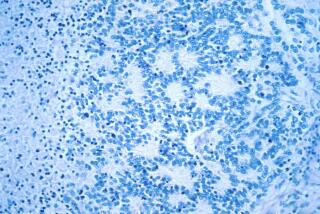Drug Aids Children’s Hearts in Cancer Therapy
- Share via
Long-term damage to children’s hearts caused by chemotherapy can be reduced or eliminated by the drug dexrazoxane -- without impairing the therapy’s ability to kill cancer cells, doctors report today in the New England Journal of Medicine.
In a four-year study of 101 children undergoing chemotherapy for leukemia, patients taking the drug had dramatically lower levels of a protein indicating damaged heart muscle cells.
The new treatment may reduce the risk of heart failure for childhood cancer survivors -- currently eight times higher than in the rest of the population -- and may also be able to alleviate heart damage from other treatments, including kidney dialysis and heart surgery.
“Does dexrazoxane reduce the amount of cardiac muscle injury during chemotherapy?” asked Dr. Steven E. Lipshultz, chairman of pediatrics at the University of Miami School of Medicine and lead author of the study. “The answer is unequivocally yes.”
More than three-quarters of children with leukemia -- the most common childhood cancer -- now survive at least five years after their diagnosis.
But with more than 250,000 childhood cancer survivors in the United States, long-term side-effects of the cancer treatments have become a significant concern.
Doctors have long known that doxorubicin, also known by the brand name Adriamycin, causes heart problems during therapy, Lipshultz said.
The chemotherapy drug forms molecules called free radicals when it combines with iron in the bloodstream. These free radicals chew up heart muscle, forming scar tissue and releasing a protein called troponin T into the blood.
The same free radicals are also formed during other treatments, including kidney dialysis and heart bypass surgery.
Levels of troponin T in patients who took chemotherapy alone began increasing rapidly after 60 days of the 240-day-long therapy.
But troponin levels hardly changed in patients who also took dexrazoxane as a protectant.
The compound prevents damage because it also binds to iron but in a harmless way, preventing the chemotherapy from forming damaging free radicals, Lipshultz said.
The use of dexrazoxane did not seem to reduce the effectiveness of the chemotherapy, according to the study. About 80% of the children in the study showed a complete remission of their cancer. The rate was the same for the group that took dexrazoxane and the group that did not.




